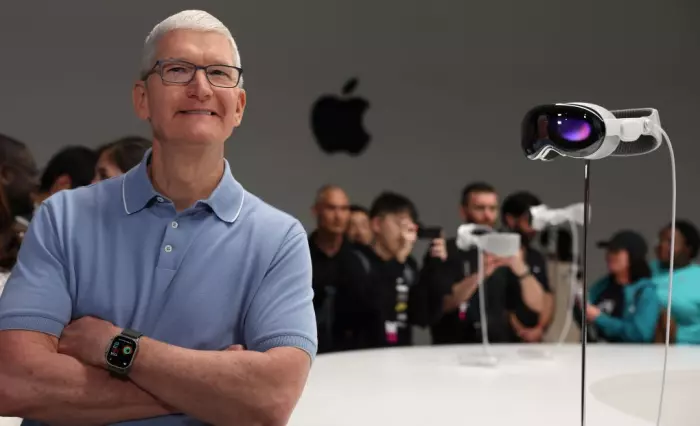Apple's highly anticipated artificial intelligence upgrades for Siri have been significantly delayed, pushing key features originally promised for early 2025 into 2026 or beyond.
It’s a major setback for Apple, a company renowned for the quality of its products and the one everyone thought had the best chance of making artificial intelligence (AI) indispensable to Apple users’ daily lives.
In June 2024, Apple unveiled its "Apple Intelligence" suite with considerable fanfare, positioning enhanced AI capabilities for its voice assistant Siri as the centrepiece.
'Fascinating'
Apple promised a more contextually aware assistant to understand personal information, navigate between apps and perform complex tasks based on user data.
Local Apple fan and Xero founder Rod Drury penned a LinkedIn post after the announcement pointing out that Apple Intelligence was another “compelling lock-in” for Apple.
“Controlling the device gives them such an advantage we’ll probably end up doing less with Google. It’s fascinating,” he wrote.
But Drury also put his finger on what may well explain Apple’s decision to go back to the drawing board with its AI-powered Siri. The email inbox is the heart of the iPhone, containing the most personal information of all the apps on the phone.
However, like Drury, many iPhone users don’t access email via Apple’s native Mail app; they use Gmail or Outlook, essentially viewing a picture of their email stored on cloud platforms.
“But Apple needs that data to hydrate the new Siri so it can parse, tokenise and build context to create personal intelligence,” Drury explained.
Walking back claims
Without adequate access to several key third-party apps Apple doesn’t control, Apple Intelligence will forever be a broken and incomplete experience.
At an Apple Intelligence briefing I attended in December, I expected Apple to outline a host of third-party apps now compatible with Apple Intelligence and the supercharged Siri, a good six months after the unveiling.
However, it rehashed previously announced features native to Apple devices, such as the ability to route queries to OpenAI's ChatGPT, transcribe voicemail messages, and summarise your email inbox in Apple’s Mail app.
The delay has become particularly embarrassing for Apple, given its extensive marketing of Apple intelligence. The company even produced advertisements showcasing capabilities that weren't yet ready, including one featuring actor Bella Ramsey, who has since been pulled from YouTube.
Apple has now added disclaimers to its website, stating that "Siri's personal context understanding, onscreen awareness, and in-app actions are in development and will be available with a future software update”.
The situation has created tension within Apple's Siri division. Robby Walker, a senior director overseeing Siri, reportedly described the situation as "ugly" and admitted that promoting the features before they were ready was a mistake.
Apple's addition of disclaimers and public acknowledgement of the delays are at least a step in the right direction. But its hope that Apple Intelligence would kick off a wave of iPhone upgrades now appears in tatters.
Eaten alive by the competition
Apple's competitive position in the AI assistant space continues to erode as Google, Amazon and Samsung rapidly implement generative AI technologies in their virtual assistants. Samsung’s Galaxy S25 smartphone debuted this month with tight integration with Google’s Gemini personal assistant, which allows some cross-app AI functionality. Amazon also released its AI-powered upgrade to its Alexa digital assistant.
Industry rumours suggest Apple will soon make Gemini available natively on the iPhone.
When one of the richest, most innovative companies stumbles like this, it's a sobering lesson in how to deal with the trending tech of the moment – generative AI.
AI development clearly takes longer than anticipated. While many of Apple’s competitors have gotten away with shipping unfinished features and iterating based on feedback, that will not cut it for discerning Apple users.
Many analysts point out that Apple has underinvested in AI compared to its competitors, a decision that belatedly led to it scrambling to build cloud infrastructure, develop its own AI chip architecture to support Apple Intelligence and attempt the complex task of merging the legacy Siri with new AI-driven features.
As PwC noted in its 2025 AI predictions, "those that pull ahead of the pack – whether AI native companies or established companies that reinvent themselves quickly – will likely stay there".
Microsoft is experiencing its own version of reality: not living up to its AI hype. Last year, its Copilot+ PCs received underwhelming reviews, and the AI features were undercooked.
The subscription-based attributes of Copilot in Microsoft 365 get mixed reviews at best.
I’ve recently spoken to businesses that have cancelled their subscriptions, while another large New Zealand company told me it was opening up access to all of its employees to give them an opportunity to get used to working with AI.
Balancing innovation with quality
“Microsoft has really disappointed so many of our customers,” Salesforce founder Marc Benioff told Business Insider in November. “They’ve really done it by delivering a level of hype around their AI solutions.”
Every day, a press release lands in my inbox, sent by an NZ company launching a new AI feature or service. Few live up to the marketing hype.
Our startups and larger companies embracing AI need to balance innovation with quality.
Sure, it's a dilemma. Apple isn’t prepared to ship undercooked AI features, which is admirable. But it is also at risk of remaining an also-ran player in the AI space due to underinvestment and underestimating the challenges of delivering quality AI-driven products and services.
We’ve learned so much from how Apple repeatedly gets it right in terms of innovative design and delivering a great customer experience.
There’s also a great opportunity to learn from how Apple got it wrong.













